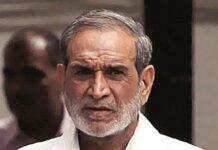
Photo: Twitter
New Delhi (PTI): Congress leader Jagdish Tytler on Monday refused to give consent to undergo a lie detection test in a 1984 anti-Sikh riots case in which he was earlier given a clean chit by the CBI on three occasions.
Tytler, in an affidavit filed before Additional Chief Metropolitan Magistrate Shivali Sharma, said he does not wish to undergo the test as sought by the CBI.
The counsel for controversial arms dealer Abhishek Verma, a key witness in the case, told the court that his client was unwell and sought time for his personal appearance to explain the conditions for undergoing the polygraph test.
The court granted time to Verma’s counsel and listed the matter for June 2 for further proceedings.
The court had on May 9 directed Tytler and Verma to give an “unambiguous” reply on whether they wanted to undergo lie detection test. It had held that the CBI’s plea for obtaining their consent for the test was maintainable.
It had said if there were any conditions attached to the consent, Tytler and Verma should appear in person for clarification.
The CBI’s move seeking permission to conduct polygraph test on Tytler and Verma came in pursuance to the court’s December 4, 2015 order in which it was mentioned that the lie-detection test may be conducted, if required.
The case pertained to the riots at Gurudwara Pulbangash in North Delhi where three people were killed on November 1, 1984, a day after the assassination of then Prime Minister Indira Gandhi.
Tytler, who has denied any role in the riots, was given clean chit by the CBI thrice in the case, but the agency was directed by the court to further investigate the matter. The victims had filed a protest petition challenging the CBI’s closure reports in the case.
The court had in December 2015 directed the CBI to further investigate the matter and said it would monitor the probe every two months to ensure that no aspect is left uninvestigated.
The agency had reinvestigated the case of killing of Badal Singh, Thakur Singh and Gurcharan Singh near the gurudwara after a court in December 2007 refused to accept its closure report. The CBI has filed three closure reports in the case.












